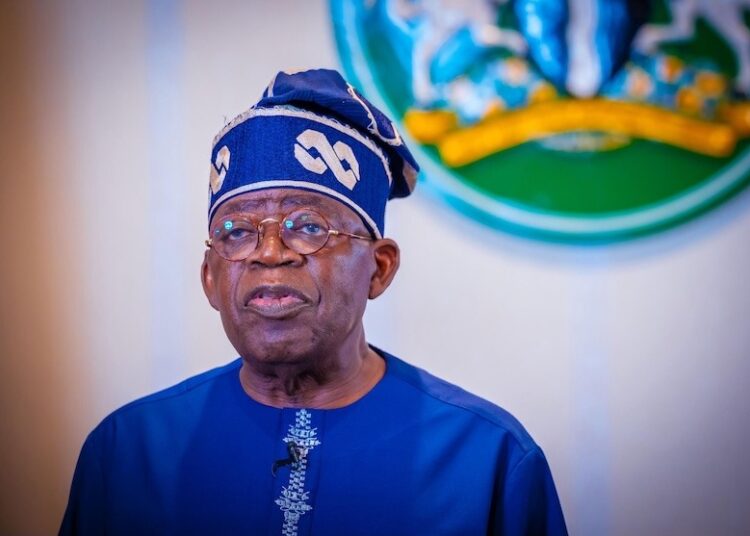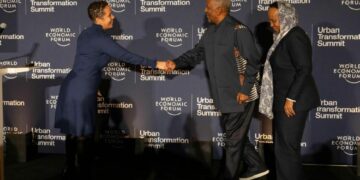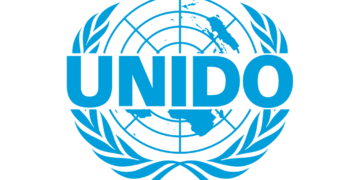In Nigerian politics, endorsements are like pre-rain thunder – sometimes loud, sometimes dramatic, and often signaling where the storm is headed. So, when the North-East wing of the All Progressives Congress (APC) endorsed the Tinubu-Shettima joint ticket for 2027, it was less about surprise and more about timing.
The setting was Gombe. The drama? A classic case of political misstep — or what our people would call “not reading the room.” Reports filtered out that the APC national chairman, Dr. Abdullahi Umar Ganduje, in his remarks, mentioned President Bola Ahmed Tinubu’s name for endorsement but initially left out Vice President Kashim Shettima. That moment, however brief, sent murmurs through the room like a skipped heartbeat.
Now, let’s be clear — the omission was quickly corrected. But in politics, especially northern politics, symbolism is everything. And in a region that has already nursed whispers about the future of the vice presidency, every word — or silence — carries weight.
The endorsement was later clarified and re-affirmed as a joint ticket, with Shettima’s name restored to the script. Still, that initial blunder struck a chord, not because it meant anything immediate, but because of what it could have suggested.
President Tinubu’s political history is not lost on those watching from the sidelines. As Lagos State governor, he famously changed deputies mid-stream. So, when questions start swirling about 2027 and the vice presidential slot, it’s not entirely paranoia — it’s political PTSD.
But let’s look at the facts.
Since assuming office, Vice President Shettima has been nothing short of a loyal wingman. Whether he’s representing the President abroad, speaking at national events, or addressing the press, Shettima has always put his boss first. He’s been articulate, diplomatic, and fiercely loyal — perhaps too loyal, some might say, but in Nigerian politics, that’s a prized trait.
In many ways, Shettima has embodied the spirit of a vice president who knows the job is not to shine alone, but to reflect light back to the centre. He’s been a steady hand, a calming voice, and a useful bridge between North and South — especially at a time when national unity remains a fragile aspiration.
So why the scepticism?
Well, some believe the North-West — Nigeria’s political juggernaut — is already eyeing the vice presidential slot for 2027. The argument is that with the presidency in the South-West, the number two slot should rotate to the largest voting bloc in the North. But that would be both politically risky and morally tone-deaf.
Let’s not forget: the North-West produced President Muhammadu Buhari for eight years. It also currently holds the APC national chairmanship — a position that, by the party’s original zoning arrangement, belongs to the North-Central. Yet, somehow, it found its way to Ganduje — another North-Westerner.
Now, to attempt a second-term ticket without Shettima would be a betrayal, not just of loyalty, but of balance. The North-East, despite its electoral value, often feels like the overlooked middle child in Nigeria’s northern political household. Dropping Shettima would confirm their worst fears — that the zone is only courted during elections but quickly forgotten afterward.
Besides, politically speaking, there’s no compelling reason to rock the boat.
The Tinubu-Shettima duo has worked well so far. While the administration still battles with inflation, fuel costs, and economic recovery, what cannot be denied is the internal cohesion at the top. That’s not something any wise political strategist should tamper with — especially not in a country where leadership harmony is often taken for granted until it collapses.
Even President Tinubu, who is not known for mincing words, seemed to put the matter to rest recently. At the APC National Summit, when the wave of endorsements from governors and lawmakers was in full swing, the President reminded everyone that it was a joint ticket. Case closed.
But politics being what it is — full of ambition, permutations, and kitchen-corner whisperings — don’t expect the murmurs to go away completely. Some political jobbers will still test the waters, float ideas, and gauge reactions. That’s the nature of the game. But for now, the centre is holding.
It is also worth noting the significance of the North-East endorsement at this stage. It sends a strong message ahead of 2027: that the region is standing firmly behind one of its own, and that Shettima is not just an appendage but a co-pilot. The optics matter — and in a party where zoning, balance, and silent negotiations often determine outcomes, this early move by North-East APC leaders is a bold preemptive strike.
In politics, timing is everything. And this endorsement — coming just as Nigerians are beginning to discuss the post-2023 trajectory — sets the tone for how the next battle will be fought. Not with surprises, but with statements of intent.
At the end of the day, the APC must ask itself a simple question: If it ain’t broken, why fix it?
Shettima has been loyal. He’s delivered when needed. And in a country where disloyalty is more common than rainfall, that should count for something.
As 2027 approaches, let’s hope the ruling party resists the temptation to fix what’s not broken. Because the last thing Nigeria needs right now is another round of internal political warfare disguised as “strategic repositioning.”
For now, the ticket is intact. And rightly so.





